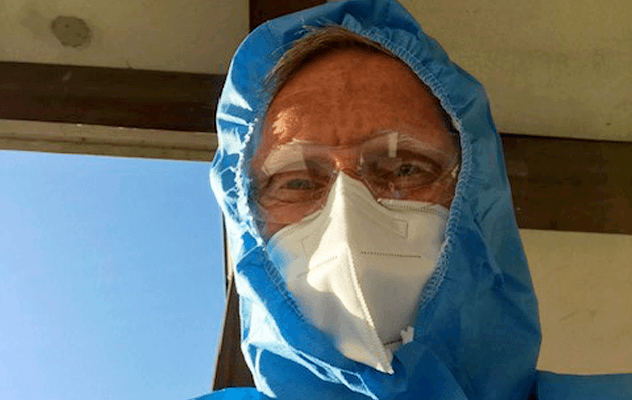Caring for Elderly COVID-19 Patients
Our latest “everyday hero” is Danny Donkers from the Netherlands.
A former nurse, Donkers is volunteering to help care for elderly COVID-19 patients suffering from dementia.

As a life sciences company dedicated to serving patients, Amgen has many trained medical professionals on its staff—and a number of them are volunteering their time and expertise to care for people with COVID-19 or at risk of infection. Among these is Danny Donkers, Oncology and Hematology Business Unit lead at Amgen’s affiliate in the Netherlands. Prior to joining the biopharmaceutical industry, Donkers worked as a registered nurse. He spoke about his ongoing volunteer assignment caring for vulnerable and high-risk residents of an understaffed elder care facility in the town of Almere in the Netherlands.
“Twenty years ago, I decided to leave nursing and join the pharmaceutical industry. It was one of the best decisions I’ve ever made—and I’ve never looked back. But as I learned about how COVID-19 was upending the lives of patients here in the Netherlands, I felt that it wouldn’t do simply to carry on with my normal duties while people around me were in such need. That’s why I decided to register on an online platform that matches former healthcare professionals with opportunities to volunteer at area hospitals, nursing homes, and other healthcare facilities.
“Shortly after signing up, I received a call on April 23 from a nearby residential facility for senior citizens. They asked me to come over as soon as possible. I did so and found a very serious and challenging situation. Coronavirus had begun to spread in the facility’s nursing unit for elderly patients with dementia, and it had already claimed the lives of 14 of the unit’s 35 patients. To compound the challenge, the facility’s staff initially lacked adequate personal protective equipment, and fully half of the nurses had contracted the virus and had to leave work.
“I discussed the situation with my Amgen supervisor, and we agreed that I should step in to help. I immediately called to let the facility know that I would report for work the following day. That evening I took a speed course in COVID-19 patient management, and the next day I worked the first of three late-night shifts (with probably more to come). I’ll admit to being apprehensive, but I also felt satisfaction in being able to do something, even in a small way, to help these extremely vulnerable and defenseless patients. I worked two of my first three shifts in the facility’s most affected unit, where half of the fourteen patients had already died and three of the remaining seven were in very bad shape.
“My work in this unit left a deep impression on me. These patients, who were living with advanced dementia, had no idea what was happening to them. They were not allowed to leave their rooms or have visits from family members, and the only people they saw were staff members wearing masks and blue protective suits. As a result, many of the patients were understandably anxious, disoriented and hostile.
“There were some bright moments—such as when I observed an elderly resident smiling broadly after he received a video call from his daughter. More often, though, the experience of these patients was quite sad. During one of my shifts, a resident passed away. Although his death was painless and was handled with great respect by the staff, it was sad to watch this man pass away alone, with no family members there to accompany him in his last moments. It was my difficult responsibility to call the man’s family to inform them of his death and help them with the challenging task of locating a funeral home with capacity to take on a new case. It still doesn’t feel right to me that someone can live a long and full life but leave their last place of residence alone and literally through the back door. When the family arrived, I found at least a bit of solace in being able to tell them across the fence about the patient’s final moments, and to know that providing this information helped the family members to manage their grief.
“Despite the physical and emotional challenges involved in this work, I appreciate the opportunity it gives me to live the Amgen Values and mission of serving patients. I intend to continue it even after the COVID-19 crisis has subsided. I feel really connected to these patients. Seeing them smile as I care for them gives me a deep sense of personal fulfillment. It has also strengthened my admiration for the other nurses, who show such dedication to their work and love for their patients. Let’s hope that one positive consequence of this pandemic will be that nurses everywhere at last receive the support and appreciation they deserve.”
As the COVID-19 pandemic continues to evolve, we are committed to doing everything we can to keep our staff and their families safe, as well as to help the communities where we live and work reduce the number of people exposed to the virus. We are also committed to continuing to deliver an uninterrupted supply of our medicines for the patients who need them. If you are a patient, medical professional, employee, or member of the community, please see our COVID-19 Information Center page.

